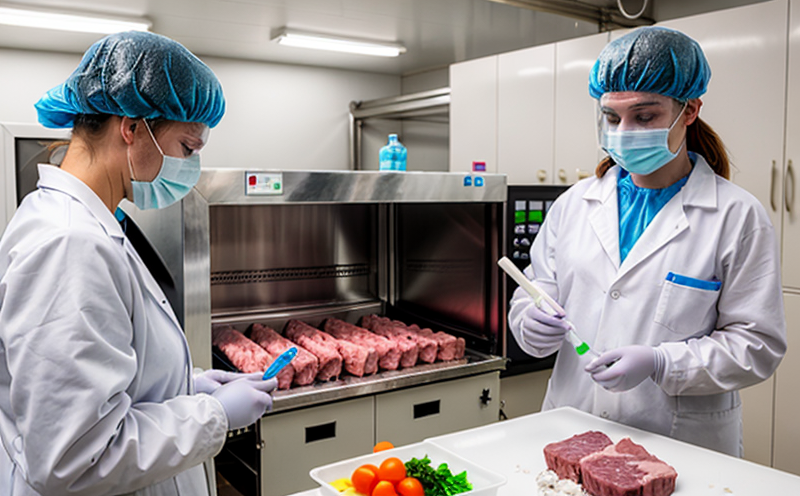Codex Alimentarius Pathogen Limit Testing in Meat Products
The Codex Alimentarius pathogen limit testing is a critical component of ensuring food safety, particularly for meat products. This stringent protocol ensures that pathogens such as Salmonella spp., Listeria monocytogenes, and Escherichia coli O157:H7 are kept within permissible limits to safeguard public health.
The Codex Alimentarius is a joint United Nations Food and Agriculture Organization (FAO) and World Health Organization (WHO) initiative aimed at protecting the health of consumers and promoting fair practices in the international food trade. Under this framework, pathogen limits are established to ensure that meat products meet global safety standards.
The process involves meticulous sampling of raw, semi-processed, or fully processed meat products from various stages of production. Samples are then transported under controlled conditions to our laboratory for testing. Our team of experts uses advanced microbiological techniques and cutting-edge equipment to analyze the samples thoroughly.
For Salmonella spp., we follow a series of steps including enrichment, isolation, and confirmation tests as per ISO 6579:2016. Listeria monocytogenes testing involves the use of FDA Bacteriological Analytical Manual (BAM) methods such as plating on selective media followed by confirmatory tests like PCR or serotyping as per ASTM E380-14. E. coli O157:H7 is detected using ISO 21361:2019 which includes enrichment, isolation, and confirmation.
The testing process also involves a comprehensive validation of the methods used to ensure that they are accurate, precise, and reproducible. This includes assessing recovery rates from spiked samples and evaluating inter-laboratory consistency. The results are reported back to our clients within 5 working days post receipt of the sample.
The importance of this testing cannot be overstated given its role in ensuring compliance with international regulations and maintaining consumer trust. Our laboratory adheres strictly to these guidelines, providing reliable data that can inform necessary process improvements or product recalls if required.
By leveraging our expertise in microbiological analysis, we help clients meet their regulatory obligations while enhancing the safety profile of their products. This not only protects public health but also strengthens brand reputation and market competitiveness.
Applied Standards
| Standard | Description |
|---|---|
| ISO 6579:2016 | Microbiology of food and animal feeding stuffs — Horizontal method for the detection of Salmonella spp. in foods. |
| ASTM E380-14 | Bacteriological Analytical Manual (BAM) methods for Listeria monocytogenes in food. |
| Standard | Description |
|---|---|
| ISO 21361:2019 | Microbiology of food and animal feeding stuffs — Horizontal method for the detection and enumeration of Escherichia coli O157:H7 in foods. |
International Acceptance and Recognition
The Codex Alimentarius pathogen limit testing is widely recognized by governments, regulatory bodies, and international organizations. Compliance with these standards ensures that meat products can be traded globally without facing unnecessary barriers. This recognition also enhances the credibility of our laboratory among industry stakeholders.
Our laboratory has been certified to perform these tests according to ISO/IEC 17025:2017, which sets international standards for the competence of testing and calibration laboratories. This certification guarantees that we maintain a high level of quality in all our services.
The results from our pathogen limit testing are accepted by numerous countries including the United States, European Union member states, Australia, New Zealand, Canada, and Japan. This global acceptance underscores the importance of adhering to Codex Alimentarius guidelines for meat products.
Competitive Advantage and Market Impact
By providing accurate and timely pathogen limit testing results, our clients gain a competitive edge in the market. This is particularly crucial in today's highly regulated food industry where consumer trust plays a pivotal role.
Our service helps companies ensure that their products meet or exceed regulatory requirements, thereby reducing the risk of product recalls and associated costs. It also allows them to maintain a consistent quality standard across different markets, enhancing brand reputation and customer satisfaction.
In addition, adherence to Codex Alimentarius standards can open up new market opportunities for our clients. Many countries have implemented legislation requiring imported meat products to comply with these guidelines. By ensuring compliance through our testing service, companies position themselves favorably in the eyes of both domestic and international customers.





